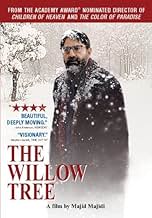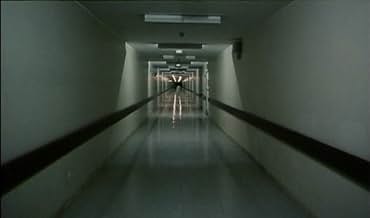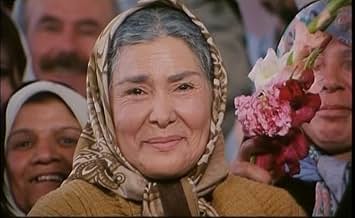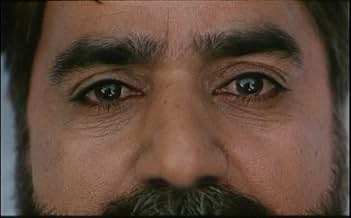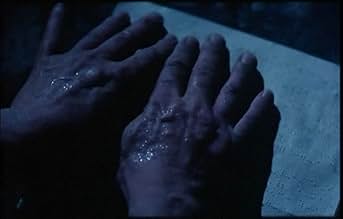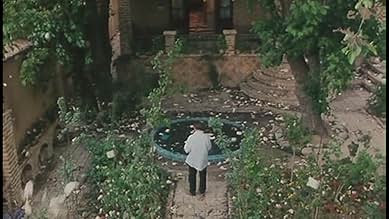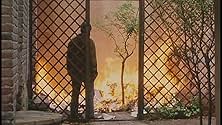AVALIAÇÃO DA IMDb
7,3/10
4,7 mil
SUA AVALIAÇÃO
Adicionar um enredo no seu idiomaYoussef, a blind university professor, is suddenly diagnosed with a fatal disease and must undergo treatment in France. Back home, will he find the life he had before?Youssef, a blind university professor, is suddenly diagnosed with a fatal disease and must undergo treatment in France. Back home, will he find the life he had before?Youssef, a blind university professor, is suddenly diagnosed with a fatal disease and must undergo treatment in France. Back home, will he find the life he had before?
- Direção
- Roteiristas
- Artistas
- Prêmios
- 2 vitórias e 2 indicações no total
Soghra Obeisi
- Aziz
- (as Afarin Obeisi)
Leila Otadi
- Pari
- (as Leila Outadi)
Avaliações em destaque
I have been deeply moved by "The Willow Tree," which I saw this evening as part of an Iranian film series at the Freer Gallery in Washington DC. I am not sure that any Western culture could ever produce something as beautiful, but I hope all westerners see it. It has impressed positively and permanently. I was most moved by the scene of the hero coming back to Iran, and seeing his mother, and then again, when the mother comes to his house after his wife has left. The most beautiful, was our hero looking for the papers in the pond, and finding that special one. The ending is magnificent, as it allows us to ponder which is better, to continue blind, or be blessed again with sight. But in either case he seems condemned. Thank you. James
Begins well. Ends well. The histrionics of the lead character Youssef in the mid-section make the film flounder. The actress Roya Temourian (playing the loyal wife Roya) is beautiful and a delight to watch on screen in this film, though unrecognizable in her recent photographs.
Youssef's sudden interest in Pari and a beautiful woman in a train is both understandable and Quixotic.
The pact with his Creator for regaining sight is interestingly discussed and captured.
Youssef's sudden interest in Pari and a beautiful woman in a train is both understandable and Quixotic.
The pact with his Creator for regaining sight is interestingly discussed and captured.
In the lyrical and touching Iranian drama "The Willow Tree," a middle-aged college professor, blind since the age of eight, regains his sight after undergoing a cornea transplant.
Through the years, Yusef has learned to function in a world of darkness. He even long ago stopped blaming God for his condition (he went blind while playing with firecrackers as a boy). Having made his peace with his situation, Yusef is now suddenly confronted with the unforeseen mixed blessing of regaining his sight. On the one hand, he yearns to be able to once again behold the vast and myriad beauties of the visual world; on the other, he risks losing the sense of security and comfort that comes from living in a world that is real and familiar to him.
Director Majid Majidi captures some of the visual sensory overload Yusef experiences when he is once again reunited with the sighted world, which includes seeing his wife and young daughter for the first time. And how will the change in his condition affect the couple's relationship - the roles each of them plays within that relationship, and the ways in which they interact with one another? For now that he is no longer dependent on others to get around and is free to do things on his own, Yusef begins to press against the tightly-bound parameters of his heavily circumscribed life, falling for a beautiful young student in one of his classes and becoming less willing to play the part of the uncomplaining, long-suffering victim to please his wife and mother who have found their own purpose and meaning in taking care of him all these years. Then Fate plays a cruel trick on him, making him realize that he can never be fully happy in either state of sightedness (Majidi doesn't cater to his audience's desire for an uplifting, happy ending).
To emphasize the way in which Yousef experiences the world, the movie features a hyper-sensitive soundtrack filled with the amplified sounds of birds chirping, water gurgling, leaves rustling, raindrops falling, etc. The only real disappointment is the musical score, which is often lugubrious, soupy and overly-emphatic.
Much of "The Willow Trees"'s success can be attributed to Parviz Parastui's subtle and wide-ranging performance in the lead role. As Yusef, Parastui runs the gamut from submissive introvert to railing despondent without hitting a single false note at either end.
Through the years, Yusef has learned to function in a world of darkness. He even long ago stopped blaming God for his condition (he went blind while playing with firecrackers as a boy). Having made his peace with his situation, Yusef is now suddenly confronted with the unforeseen mixed blessing of regaining his sight. On the one hand, he yearns to be able to once again behold the vast and myriad beauties of the visual world; on the other, he risks losing the sense of security and comfort that comes from living in a world that is real and familiar to him.
Director Majid Majidi captures some of the visual sensory overload Yusef experiences when he is once again reunited with the sighted world, which includes seeing his wife and young daughter for the first time. And how will the change in his condition affect the couple's relationship - the roles each of them plays within that relationship, and the ways in which they interact with one another? For now that he is no longer dependent on others to get around and is free to do things on his own, Yusef begins to press against the tightly-bound parameters of his heavily circumscribed life, falling for a beautiful young student in one of his classes and becoming less willing to play the part of the uncomplaining, long-suffering victim to please his wife and mother who have found their own purpose and meaning in taking care of him all these years. Then Fate plays a cruel trick on him, making him realize that he can never be fully happy in either state of sightedness (Majidi doesn't cater to his audience's desire for an uplifting, happy ending).
To emphasize the way in which Yousef experiences the world, the movie features a hyper-sensitive soundtrack filled with the amplified sounds of birds chirping, water gurgling, leaves rustling, raindrops falling, etc. The only real disappointment is the musical score, which is often lugubrious, soupy and overly-emphatic.
Much of "The Willow Trees"'s success can be attributed to Parviz Parastui's subtle and wide-ranging performance in the lead role. As Yusef, Parastui runs the gamut from submissive introvert to railing despondent without hitting a single false note at either end.
Never have I seen such a topic on-reel. And Majid Majidi does it with finesse, cooked up with traces of sentiments and etching up emotions into a beautiful layer of life lesson.
The Willow Tree talks about a taciturn, blind professor and his lives, before and after a surgery that changes his life forever. Before, he is calm and loving. He loves his family & work. Then comes life values and when God puts him on test, things go pumping and wrecking. What brought luck to him, snatches all his glorious memories and turns him into something he never thought he'd become.
The plot goes heavy on the darker and duller side towards the end, depicting how life can turn upside down, if we slip the path once. Chiefly, it talks about the dangers of life that we want or never ever dreamed of. Lots of thing depicted, lots of things to learn, this film is a perfect blend of life and interpretation. It cannot be debated as to why the divine power creates things as they are and this story gives us a promising insight. Cast is so beautifully active, the message is brightly conveyed. Music is very good.
BOTTOM LINE: Majidi is a master and as like all his films, this one is another feather in his hat.
Profanity/Vulgarity/Sex/Porn: No | Violence: Mediocre | Gore/Alcohol/Smoking: No | Gore: Mediocre
The Willow Tree talks about a taciturn, blind professor and his lives, before and after a surgery that changes his life forever. Before, he is calm and loving. He loves his family & work. Then comes life values and when God puts him on test, things go pumping and wrecking. What brought luck to him, snatches all his glorious memories and turns him into something he never thought he'd become.
The plot goes heavy on the darker and duller side towards the end, depicting how life can turn upside down, if we slip the path once. Chiefly, it talks about the dangers of life that we want or never ever dreamed of. Lots of thing depicted, lots of things to learn, this film is a perfect blend of life and interpretation. It cannot be debated as to why the divine power creates things as they are and this story gives us a promising insight. Cast is so beautifully active, the message is brightly conveyed. Music is very good.
BOTTOM LINE: Majidi is a master and as like all his films, this one is another feather in his hat.
Profanity/Vulgarity/Sex/Porn: No | Violence: Mediocre | Gore/Alcohol/Smoking: No | Gore: Mediocre
This film can be described as a companion piece to Majidi's highly acclaimed Color of Paradise. In that movie, in which a father saw his blind son as a burden and not as a blessing, we (& eventually the father) began to "see" the world from the blind boy's view and in doing so saw a much richer, meaningful world. Here, the characters of the father and the son are embodied in a single person: Yusef who after 38 years of being blind regains his sight. What he sees, however, is quite different to what he "saw" as a blind man, and not necessarily more beautiful or rewarding. Majidi takes the viewer to a higher, more spiritual world and in doing so creates another masterpiece. Majidi's movies are visually stunning and have such a profound effect on the viewer that when we leave the cinema, we see the world in a different light. Parviz Parastoui, one of the best actors in the Iranian cinema and theatre, is outstanding as Yusef. Also worth mentioning is Mahmood Kelari's exceptional photography. As in all Majidi films, there are scenes which will stay with you long after the movie is over.
Principais escolhas
Faça login para avaliar e ver a lista de recomendações personalizadas
Detalhes
Bilheteria
- Faturamento bruto nos EUA e Canadá
- US$ 25.752
- Fim de semana de estreia nos EUA e Canadá
- US$ 6.048
- 5 de ago. de 2007
- Faturamento bruto mundial
- US$ 51.499
- Tempo de duração
- 1 h 36 min(96 min)
- Cor
- Mixagem de som
- Proporção
- 1.85 : 1
Contribua para esta página
Sugerir uma alteração ou adicionar conteúdo ausente

